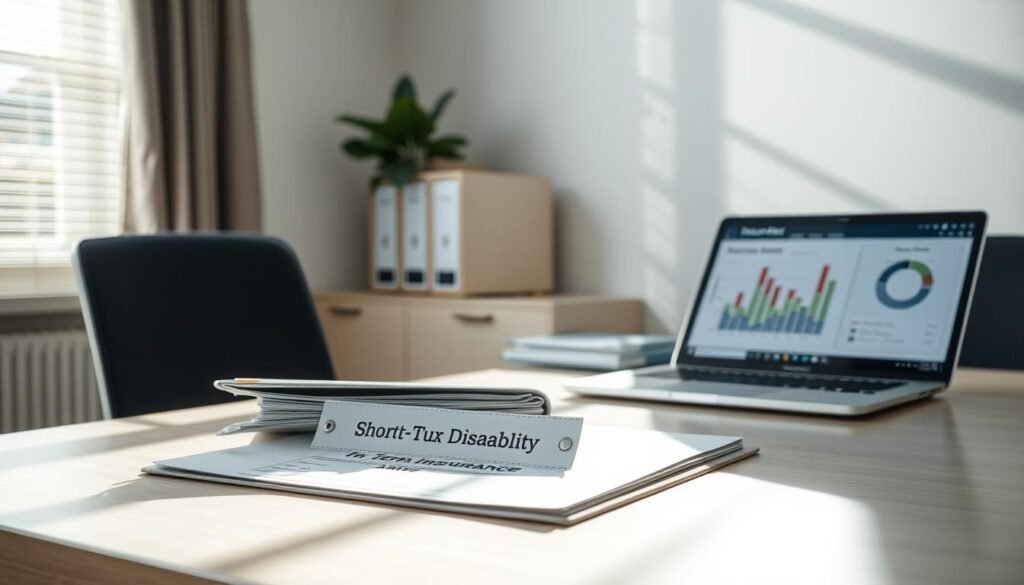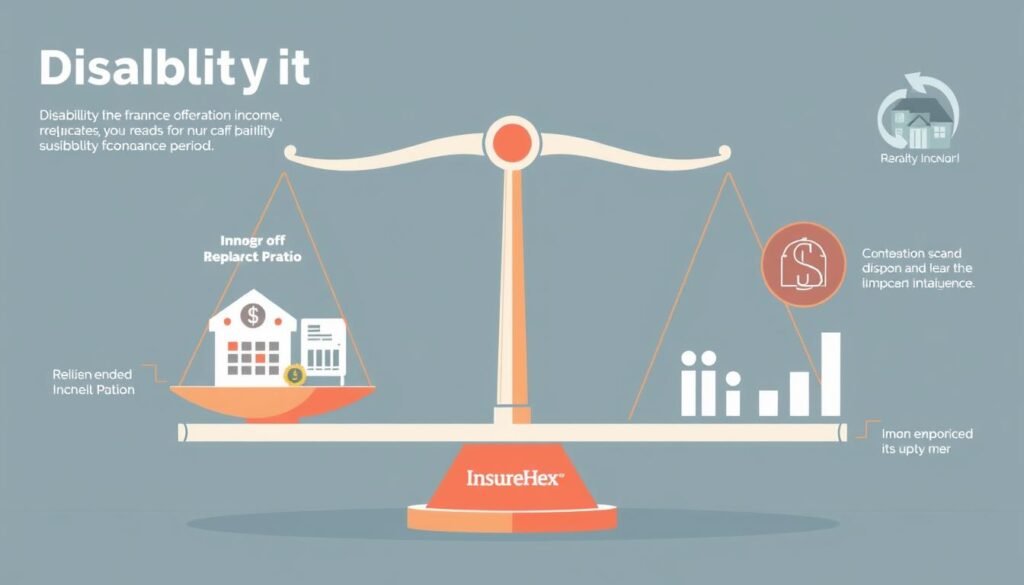In the United States, over 1 in 4 of today’s 20-year-olds will become disabled before retirement. This is a shocking fact. It shows how vital disability insurance is. It can be the difference between financial security and disaster.
Disability insurance is key to protecting our income. It replaces a part of your income if you can’t work due to illness or injury. It helps you and your family keep up with your lifestyle, even when things get tough.
Key Takeaways
- Disability insurance replaces a portion of your income if you become unable to work due to a covered illness or injury.
- Protecting your income is crucial for financial security, especially in the face of unexpected medical emergencies.
- Disability insurance can help you maintain your standard of living and meet your financial obligations during a challenging time.
- Understanding the different types of disability insurance policies and the factors that affect coverage is essential for making an informed decision.
- Comprehensive disability insurance coverage can be a vital investment in your long-term financial well-being.
Understanding Disability Insurance
Disability insurance is a key financial product. It gives you income if you’re too sick or hurt to work. Knowing what is disability insurance and its importance is vital. It protects your money and keeps your lifestyle the same during tough times.
What Is Disability Insurance?
Disability insurance pays part of your income if you can’t work because of illness or injury. It helps you pay bills, mortgage, and other costs when you can’t work.
Why Is Disability Insurance Important?
The importance of disability insurance is huge. Your job is your most valuable thing. Disability insurance lets you keep supporting yourself and family if you get very sick or hurt. Without it, you might lose savings, get into debt, or even lose your home.
- Protects your income and financial stability
- Helps you maintain your standard of living
- Provides peace of mind and financial security
“Disability insurance is a critical safeguard for your most valuable asset – your ability to earn a living. It’s an investment in your financial well-being and peace of mind.”
Types of Disability Insurance Policies
There are two main types of disability insurance: short-term and long-term. Knowing the difference helps you choose the right coverage for your needs.
Short-Term Disability Insurance
Short-term disability insurance covers you for a short time, usually 3 to 6 months. It’s great for covering costs when you’re first sick or hurt. It lets you focus on getting better without money worries.
Long-Term Disability Insurance
Long-term disability insurance covers you for a long time, even until you retire. It’s for serious or permanent disabilities. It keeps your family safe financially if you’re disabled for a long time.
When picking a policy, think about the waiting period, how much you’ll get, and for how long. This ensures you’re protected financially.
| Short-Term Disability Insurance | Long-Term Disability Insurance |
|---|---|
| Provides income replacement for 3-6 months | Provides income replacement up to retirement age |
| Helps cover initial expenses during recovery | Offers more comprehensive, long-term coverage |
| Typically has a shorter waiting period | Typically has a longer waiting period |
| May have lower premiums | May have higher premiums |

Understanding short-term disability insurance and long-term disability insurance helps you choose wisely. This protects your financial future and gives you peace of mind against disability.
Factors Affecting Disability Insurance Coverage
Many things can change how much you pay for disability insurance and how well it protects you. Knowing these factors is key to picking the right insurance for you. This ensures you get the coverage you need without breaking the bank.
Your age is a big factor. The younger you are, the less you’ll pay because you’re less likely to get disabled. As you get older, your premiums go up because the risk of getting disabled increases.
Your job also matters a lot. Jobs that are risky or hard on your body, like construction or being a first responder, cost more. But, jobs that are easier, like sitting at a desk, might be cheaper.
| Occupation | Disability Risk | Typical Premium Range |
|---|---|---|
| Construction Worker | High | $50 – $100 per month |
| Office Administrator | Low | $30 – $60 per month |
| Registered Nurse | Moderate | $40 – $80 per month |
Your income is another big factor. Insurance policies usually cover a part of what you made before you got disabled. If you make more money, you might get a bigger benefit, but you’ll pay more for it.
Lastly, your health is very important. If you have health problems or a history of illness, you might pay more or have some conditions not covered. Staying healthy can help you get better rates.
By knowing these key factors, you can choose the right disability insurance for you. This way, you get the protection you need without spending too much.
Calculating Your Disability Insurance Needs
Protecting your income if you become disabled is key. You need to think about the income replacement ratio and the benefit period.
Income Replacement Ratio
The income replacement ratio is how much of your income your policy will cover. Policies usually aim to replace 50% to 80% of your earnings. This helps you keep your lifestyle while you recover.
Benefit Period
The benefit period is how long your policy will keep paying you. It can last from a few months to years, or even until you retire. A longer period means better coverage but costs more.
To find the right disability insurance income replacement ratio and benefit period, think about your financial needs and future income. Also, consider how you’ll cover any gaps in coverage. This careful planning ensures you get the right policy for your financial security.
| Disability Insurance Coverage Factors | Considerations |
|---|---|
| Income Replacement Ratio | Typically 50% to 80% of pre-disability income |
| Benefit Period | Ranges from a few months to several years, or until retirement age |

“Protecting your income with the right disability insurance coverage is essential for safeguarding your financial future.”
Disability Insurance: Protect Your Income Today
Disability insurance is key to securing your financial future. It keeps your income safe if you can’t work due to illness or injury. This way, you can keep your standard of living.
Disability insurance acts as a safety net. It helps you pay bills and care for your family. It’s vital for anyone who works, whether full-time or running their own business. It gives you peace of mind and financial security.
Here are the main benefits of disability insurance:
- Replaces a portion of your lost income, typically 60-80%, to help you cover essential expenses
- Offers both short-term and long-term coverage, depending on your needs
- Provides tax-free benefits in many cases, maximizing your financial resources
- Protects your ability to maintain your current lifestyle and support your dependents
Investing in disability insurance to protect your income secures your financial future. It lets you focus on getting better, not on money worries. Don’t risk your income – get a good disability insurance policy today.
“Disability insurance is the most overlooked type of insurance, but it’s one of the most important. It protects your greatest asset: your ability to earn an income.”
Getting disability insurance to protect your income is smart for your finances. It ensures your income and lifestyle are safe, even with health surprises.
Employer-Sponsored Disability Insurance
Many employees count on their employer’s disability insurance to protect their income. These group disability insurance plans are often cheaper than individual policies. They offer great protection.
Employer-sponsored disability insurance helps if you can’t work because of illness or injury. It’s part of many employers’ benefits packages. This makes it easy for many workers to get it.
Understanding Group Disability Insurance Plans
Group disability insurance plans have their own features and limits. It’s key to know about them. Here are some important points:
- Coverage levels: Group plans usually cover 50% to 60% of your income before disability.
- Benefit duration: You can get benefits for a short time (up to 6 months) or a long time (up to retirement).
- Eligibility requirements: You might need to work a certain number of hours or be employed for a certain time to qualify.
- Exclusions and limitations: Some plans might not cover pre-existing conditions or certain disabilities.
It’s crucial to check your employer’s disability insurance plan. Make sure it fits your financial needs. Comparing it to your personal situation can show if you need more private insurance.

“Employer-sponsored disability insurance can be a valuable safety net, but it’s important to understand the specifics of your plan to ensure it aligns with your financial needs.”
Individual Disability Insurance Policies
If your employer doesn’t offer disability insurance or the coverage is not enough, you can buy an individual disability insurance policy. These policies let you customize the coverage to fit your needs, income, and job. Getting an individual policy adds extra financial protection to what your employer offers.
Individual disability insurance policies have big advantages over group plans. They are portable, so you can keep them if you switch jobs. Also, the cost and coverage depend on your personal risk, not the group’s. This means you get a policy that really fits you.
When looking at an individual disability insurance policy, think about your income, job, and risks. Your age, health, and job type affect the coverage and cost. Talking to a financial advisor or insurance expert can help you find the right coverage and value for your money.
Getting an individual disability insurance policy gives you peace of mind and financial security. By understanding your needs and options, you can find a policy that protects your income and keeps your finances safe.
Disability Insurance for Self-Employed Individuals
As a self-employed person, your income depends on your work. Disability insurance is key to protect your earnings. It ensures you can keep up with financial duties if you get disabled.
Protecting Your Business Income
A disability can hurt your business’s money health when you’re self-employed. Disability insurance for self-employed folks offers a safety net. It replaces some of your lost income, letting you recover without worrying about money.
- Disability insurance can cover some of your business’s costs, like rent and salaries.
- It also helps you find a new owner or manager for your business, keeping it running smoothly.
- By insuring your business income with disability insurance, you can keep your lifestyle and support your family during tough times.
Looking into disability insurance made for self-employed people is crucial for your financial safety. The right coverage lets you heal, knowing your business is safe.

Social Security Disability Benefits
Social security disability benefits are key for protecting your income if you become disabled. These benefits are from the government. They help those who have worked and meet the disability criteria.
To get these benefits, you must show your disability will last at least 12 months or be fatal. Your disability must be so severe it stops you from working.
The Social Security Administration (SSA) looks at your work history, medical records, and disability severity. If you qualify, you might get monthly payments to cover basic needs.
But, it’s important to know these benefits have limits. They might not cover all your expenses. Also, applying for them can be hard and take a lot of time.
That’s why having a good disability insurance plan is crucial. It can help with the social security benefits and protect your finances if you get disabled.
| Social Security Disability Benefits | Private Disability Insurance |
|---|---|
| Provided by the federal government | Purchased from a private insurance provider |
| Eligibility based on meeting strict criteria | Eligibility based on the policy’s terms and conditions |
| Monthly payments may not fully replace income | Payments can be customized to meet your financial needs |
| Application process can be complex and time-consuming | Claim process may be more streamlined |
Knowing how social security disability benefits and private insurance work together is key. It helps you plan for your financial future if you become disabled.
Occupational Disability Insurance
Some jobs are riskier than others. Jobs like construction, firefighting, and law enforcement need a lot of physical strength. They also come with special dangers. To help these workers, occupational disability insurance was created.
This insurance helps people who can’t do their job anymore. It’s different from regular disability insurance. It lets workers keep earning money even if they can’t do their job.
Protecting High-Risk Occupations
Jobs that are very dangerous need special insurance. Occupational disability insurance fills this need. It offers:
- Special coverage for dangerous jobs
- More money to help with higher incomes
- Options for partial or total disability claims
- Wider “own occupation” definition to protect jobs
This insurance is made for workers in high-risk jobs. It helps them keep their financial safety when they get hurt or sick.
| Occupation | Disability Insurance Needs | Occupational Disability Insurance Benefits |
|---|---|---|
| Construction Worker | Higher risk of physical injury, often unable to perform manual labor | Increased coverage limits, flexible partial disability options |
| Firefighter | Exposure to hazardous environments, risk of injury or illness | Expanded “own occupation” definition, higher benefit maximums |
| Law Enforcement Officer | Potential for physical altercations, stress-related health issues | Tailored policies for public safety professionals, customized coverage |
Occupational disability insurance meets the special needs of high-risk jobs. It helps protect their financial future.
“Occupational disability insurance is a critical safety net for individuals in hazardous professions. It ensures they can maintain their standard of living if a disabling event prevents them from performing their specialized duties.”
Disability Insurance and Tax Benefits
Understanding the tax benefits of disability insurance is key. Many times, you can deduct your disability insurance premiums from your taxes. This can help you get more value from your policy and lower your premium costs.
It’s important to know the type of policy you have. Premiums for individual disability insurance policies can be deducted from your taxes. But, premiums for employer-sponsored group disability insurance plans usually can’t be deducted. However, the benefits from these plans might not be taxed.
The tax on disability benefits also varies. If your benefits are seen as “earned income,” you might have to pay federal and state taxes on them. But, if they’re “unearned income,” you might not have to pay taxes on them.
Also, think about the tax on lump-sum disability insurance settlements. These settlements might get special tax treatment. This could mean big tax savings for you.
Handling disability insurance taxes can be tricky. It’s best to talk to a tax expert. They can help you use all the tax benefits you can and keep your taxes low.
Choosing the Right Disability Insurance Provider
Choosing the right disability insurance provider is key to your financial health. If something unexpected happens, it can make a big difference. When choosing a disability insurance provider, it’s important to do your homework. Look for the one that fits your needs best.
Researching Insurance Companies
It’s important to check the financial health, customer service, and policy options of potential providers. Choose insurers known for their financial strength and quick claim processing. Also, look for policies that offer partial or residual disability coverage and adjust to inflation.
- Check the financial stability and credit ratings of the insurance companies you’re considering.
- Look up customer reviews and ratings to see how each insurer performs.
- Make sure the policy options and features match your needs and goals.
By doing your homework on researching disability insurance companies, you can make a smart choice. This way, you can protect your income and financial future.
“Choosing the right disability insurance provider is a crucial step in safeguarding your financial well-being. Thorough research and comparison can help you find the best fit for your unique needs.”

In the end, choosing a disability insurance provider is a big decision. With the right research and advice, you can find the best coverage for your income and financial security.
Filing a Disability Insurance Claim
Filing a disability insurance claim requires understanding the process and what’s needed. You’ll need to submit medical records, proof of income, and follow the insurance company’s steps. Being well-prepared and working with your insurer can make the process smoother. This way, you can get the benefits you deserve.
Here are the main steps for filing a disability insurance claim:
- Gather All Necessary Documentation: Collect medical records, test results, and documents from your healthcare providers that support your claim.
- Provide Proof of Income: Gather financial records like pay stubs, tax returns, or W-2 forms to show your income before disability.
- Review Your Policy: Read your disability insurance policy carefully to know what’s needed for a claim.
- Submit the Claim: Follow the insurance company’s process for submitting a claim. This may include filling out forms and providing more information.
- Stay in Communication: Keep in touch with the insurance company during the claims process to ensure it’s moving forward.
Remember, the disability insurance claim process can be complex. If you have questions or concerns, don’t hesitate to ask your insurance provider or a financial expert.
“The key to a successful disability insurance claim is being prepared and staying organized throughout the process.”
Disability Insurance and Retirement Planning
Disability insurance is key to protecting your retirement plans. It keeps your future income safe if you can’t work due to illness or injury. By matching your disability coverage with your financial goals, you keep your retirement savings safe, even if you’re disabled for a long time.
Disability insurance fills the gap between your old income and the lower Social Security Disability benefits. This helps you avoid using up your retirement funds too soon. It lets you keep your lifestyle the same in your golden years.
Coordinating Disability and Retirement Strategies
When planning for retirement, think about how disability insurance fits into your overall plan. Here are some important points:
- Make sure your disability coverage can replace enough income to meet your retirement goals.
- Check the policy’s benefit period to match your retirement age.
- Look into how disability benefits can help your retirement accounts.
- Know the tax effects of disability insurance payments and how they affect your retirement planning.
Protecting Your Retirement Assets
Disability insurance helps keep your retirement savings safe. It stops you from using your savings too early. This way, you keep your income during a disability, protecting your retirement funds for a secure future.
| Scenario | With Disability Insurance | Without Disability Insurance |
|---|---|---|
| Disability at Age 45 | Disability benefits supplement income, allowing retirement savings to continue growing | Retirement savings depleted to cover living expenses, delaying retirement |
| Disability at Age 55 | Disability benefits provide income stability, minimizing the impact on retirement plans | Retirement savings used to cover expenses, potentially jeopardizing retirement goals |
By adding disability insurance to your retirement plan, you protect your financial future. This ensures a secure and comfortable retirement, even with unexpected health issues.
Disability insurance for doctors
Conclusion
Investing in disability insurance is key to protecting your income-earning ability. It’s important to know the different types of coverage and what you need. This way, we can keep our financial security safe, even when unexpected challenges come our way.
Disability insurance acts as a safety net, helping us focus on getting better and keeping our quality of life. With the right coverage, we can rest easy knowing our income and financial future are secure. Investing in disability insurance is a smart move that helps us face life’s uncertainties and keep our financial health strong.
The importance of disability insurance in safeguarding our earning potential cannot be overstated. By understanding our options, assessing our needs, and picking the right provider, we can protect our finances. This ensures we stay financially stable, no matter what unexpected circumstances arise.

